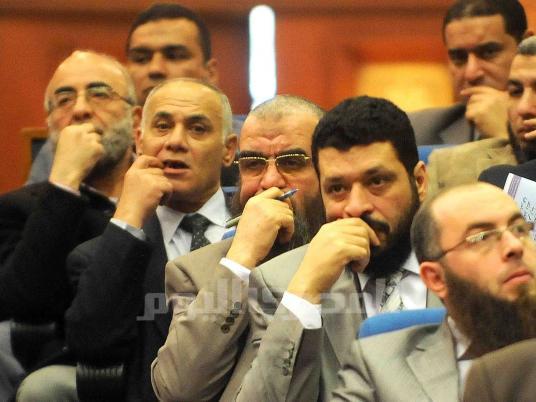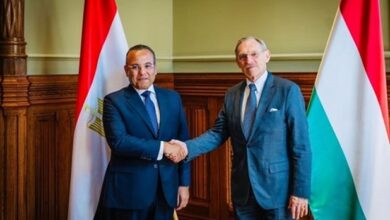
The standoff between Parliament and the cabinet reached a climax this week when cabinet members failed to attend a parliamentary session on Wednesday, forcing Saad al-Katatny, the People’s Assembly speaker, to adjourn the session until 28 March.
"I tell the government and all Egyptians that the Parliament that you elected is capable of withdrawing its confidence from the government and of specifying the prime minister's responsibilities," said Katatny angrily amid heavy cheers from members.
The Parliament, led by the Muslim Brotherhood’s Freedom and Justice Party, has been flashing the no-confidence card for the past two weeks, yet has not taken any serious steps to follow through on its threat.
This week, the structure of the constituent assembly that will draft Egypt's new constitution has been the main issue of public concern. The two houses of Parliament agreed on Saturday that half of the 100-member assembly will be taken from the Parliament, while the remaining 50 members will be chosen from outside the body. The decision sparked widespread outcry, with 17 public figures and constitutional experts filing a case in administrative court against Field Marshal Hussein Tantawi, Katatny and Ahmed Fahmy, the Shura Council speaker, to halt the decision, claiming it violates the March 2011 Constitutional Declaration.
In the meantime, the Parliament's committees saw a lot of activity this week, producing a number of controversial draft laws and repealing others.
The Proposals and Complaints Committee on Tuesday approved a bill submitted by independent MP Mostafa Bakry to amend Article 20 of the Presidential Elections Law. The change would expand the time frame set for presidential candidates' campaigns, so that it begins when registration for the race begins instead of three weeks before. Under the current law, campaigning can begin on 9 April and run until two days before the first day of the election.
The cabinet approved the amendment, however Omar al-Sherif, assistant justice minister for legislative affairs, said the suggested amendments should be submitted to the Supreme Constitutional Court.
In addition, the Constitutional and Legislative Affairs Committee, with the consent of the Supreme Council of the Armed Forces, in a meeting Monday approved the cancellation of Article 6 of the military judiciary law, which empowers the country's president to refer any crime to a military tribunal. However, the decision doesn't necessarily end the practice of trying civilians in military courts. The committee decided to postpone discussing the removal of Article 48 of the same law, which states that judicial authorities, including military courts, are exclusively responsible for deciding whether a felony falls within their jurisdiction.
In a controversial move, independent MP Mohamed al-Omda, deputy head of the Constitutional and Legislative Affairs Committee, submitted a draft law suggesting the cancellation of khul (a woman's right to get a divorce in court if she pays her husband back the marriage settlement). Omda said Islamic Sharia has been jeopardized by this law. The bill's explanatory memorandum says a woman's right to divorce through courts was granted to satisfy the National Council for Women, which was chaired by former First Lady Suzanne Mubarak, allegedly to save women from persecution in Middle Eastern countries.
Another heated discussion sprang up in the Human Rights Committee on Tuesday over articles in a new bill to regulate the right to protest. The articles provoked sharp criticism from several MPs, who described it as a return to the type of law issued during Mubarak's reign. Thus, the committee referred the bill back to the Constitutional and Legislative Affairs Committee.
The bill imposes penalties more than those imposed during the British occupation, and restricts the freedoms provided by the SCAF, argued MP Mohamed Monib, following a joint meeting of both committees.
Adel Afify, the deputy head of the Human Rights Committee, denounced the bill. "It should have been appended with Mubarak's signature," he said.
Omda, on the other hand, defended it, saying it handles protests rather than strikes. He pointed out that the bill includes articles that allow protesting without prior notification to the Interior Ministry and does not infringe on workers' rights to strike and demonstrate.
But the chairman of the legislative committee, Mahmoud al-Khodairy, said the existing penal code includes articles that handle protest-related crimes, which can be intensified if necessary. He called for withdrawing any bills regulating protests so as not to be mistaken for measures against the right to demonstrate.
The Religious, Social and Religious Endowments Committee agreed to work on a draft law for the establishment of a "House of Wealth" to organize zakat (Islamic alms) for the poor. The committee reiterated that the zakat payment won't be obligatory and hence won't replace tax payments.
Also this week, Wasat Party Vice President Essam Sultan accused the head of the Cairo Court of Appeals, Abdel Moez Ibrahim, of hiding the documentation of the Battle of the Camel file, in which a handful of previous Mubarak regime statesmen have been charged with killing protesters on 2 February 2011. Accordingly, Katatny demanded that Justice Minister Adel Abdel Hamid address Parliament to respond to these charges. Ibrahim also came under fire after foreign defendants were allowed to the leave the country while a controversial NGO case was being considered in court.
In another dramatic showcase of identity politics, Salafi MPs decided to leave a parliamentary session when Katatny called for a moment of silence to mourn the recently deceased Pope Shenouda III. In a TV interview shortly thereafter, Nour Party Spokesperson Nader Bakkar said standing for a minute of silence to mourn someone is not mentioned anywhere in Islamic law.
The Housing, Public Utilities and Reconstruction Committee referred the Abu Matamir City affordable housing project, which is being built by the government, to the public prosecutor for investigation. The committee said even though the government has collected millions of pounds from applicants for years, the project has still not started.
During its session on Monday, Parliament approved a raise in compensation for those whose injuries during the 25 January uprising led to permanent disabilities. The legislature also increased the amount going to families of the martyrs to LE100,000, up from the previous LE30,000 allocated by the SCAF.
Arguing about whether to include those wounded during the 18 days in the bill, FJP MP Mohamed al-Beltagy rejected other MPs' statements that the injured had received all of their deserved compensation. "Some of the injured and their families are in much more pain than the martyrs' families and we can even say that there are wounded people who are still struggling until today because of this harsh reality, either regarding their medical treatment or deteriorating social and living conditions," he said.
However, the decision was met with resistance by the government. Finance Minister Momtaz al-Saeed said the decision to increase the money distributed cannot be made without first determining the number of injured and availability of accurate medical reports to specify those who have permanent disabilities. He called for the discussion to be postponed.
On Tuesday, Parliament heatedly discussed the evolving crisis of fuel and butane gas shortages around the country, bashing the government for what it believes is delinquency on the issue.
"This persistent crisis can't be as widespread as it is across the country unless it is orchestrated. Where is the government? This government produces crises," said Katatny.
In response, Petroleum Minister Abdullah Ghorab said the problem lies not in the fuel supply but in misdistribution, pointing out that the government has increased butane gas imports.
Also on Tuesday, Parliament discussed the shoddy health care services around Egypt, as a number of MPs requested a total restructuring of the country's health care system and complained about the small number of doctors in public hospitals and health care centers in rural villages. They also demanded wage increases for doctors and providing hospitals with necessary medical facilities.
The Shura Council approved its general committee's decision to keep the editors-in-chief of state-owned newspapers in their positions until a decision is issued on how new ones will be appointed, Speaker Ahmed Fahmy said Sunday.
In the meantime, the People's Assembly's Constitutional and Legislative Affairs Committee agreed to lift legal immunity for MP Anwar al-Balkimy. who lied when he said he was attacked by masked gunmen on the highway, who robbed him of LE100,000 and left him with injuries and bruises on his face. He actually just had a nose job.



